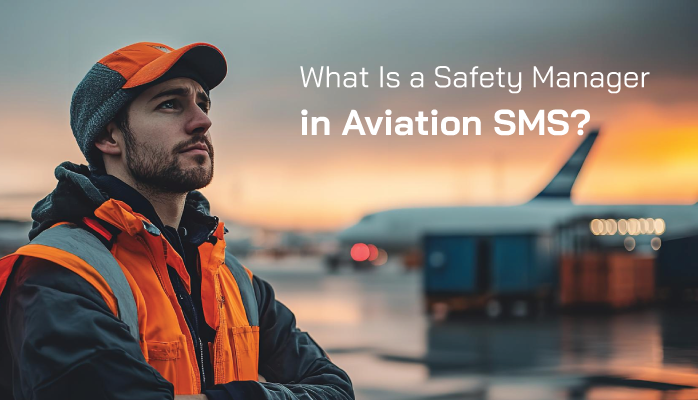What Is an Aviation Safety Manager in an SMS Program?

The aviation safety manager (SM) is the individual charged with developing, monitoring, and improving the safety management system (SMS) of the service provider.
The safety manager acts as the primary reference point for safety management issues in the organization. Safety professionals must understand risk management processes and much more.
Appointing a safety manager is a crucial step in establishing the SMS' organizational structure and planning for the aviation SMS implementation. The appointed SM may be:
- Designated as a full-time manager of safety, such as in larger organizations whose safety needs are robust enough for a full-time SMS; however
- In most organizations, the manager of safety is appointed to an individual who has other safety duties.
Related Aviation Safety Manager Articles
- What Makes a Good Aviation Safety Manager?
- 5 Types of Aviation Safety Managers
- Career Advice for Aspiring Aviation Safety Managers
Both in small and large service providers, the appointed SM will likely be the point of contact for regulatory agencies, such as the FAA or EASA.
It’s extremely important to note that the safety manager is not responsible for the aviation SMS – they are in charge of managing and directing safety operations. The accountable executive is responsible for ensuring the SMS is properly implemented and performed in all areas of the organization.
What Is a Safety Manager Responsible For?
An extremely common misnomer about safety manager responsibility is that they are ultimately responsible for the success/failure of the SMS implementation. This is not true. The accountable executive is ultimately responsible for the safety performance of the SMS.
What an aviation safety manager is responsible for is managing the SMS and facilitating the safety program’s operations, which include the above-mentioned:
- Development of the SMS;
- Supervise the implementation of the SMS;
- Safety performance monitoring; and
- Adherence to continuous improvement.
What this looks like in a real-world scenario is the following 3 components:
- Managing reported safety issues;
- Staying concurrent with safety compliance;
- Promoting and supporting SMS documentation requirements; and
- Supervising policies and procedures.
What Tasks Does an Aviation Safety Manager Perform?
The safety manager is in charge of facilitating many operational elements of an aviation SMS program, including:
- Ensuring the efficiency of safety communication;
- Monitoring that safety receives equal priority to other organizational operations, such as quality management;
- Providing safety reports;
- Risk analysis;
- Keeping documentation, such as policies, procedures, and checklists, up to date;
- Spearheading change management operations; and
- Implementing the SMS.
There are other important duties as well, but the above points cover many primary duties. It’s also important to note that while some sites, such as SKYbrary, maintain that safety managers are responsible for making sure safety receives equal priority, it’s more accurate to say they are in charge of monitoring. The accountable safety executive needs to set the precedent that safety operations are equally valuable.
Related Aviation Safety Manager Articles
- How to Tell If Aviation Safety Managers Are Doing Their Job
- 3 Essential Communication Techniques for Aviation Safety Managers
- 5 Habits of Highly Effective Aviation Safety Managers
What Does It Take to Become an Aviation Safety Manager?

Aviation safety managers almost always have a strong background in the aviation industry. Such a background could be:
- Served in the Air Force or other armed forces branch;
- Worked for an airline, airport, or other service providers;
- Is a pilot;
- Was an aviation maintenance worker; or
- Worked with an aviation regulatory agency.
As pointed out, the position of safety manager varies quite a bit from company to company. Some companies may have stringent requirements and require specific certifications for an appointed safety manager. In small organizations, a safety manager may be appointed on the quality of their:
- Aviation knowledge;
- Professional knowledge of the working environment
- Problem-solving abilities;
- Project managing skills;
- Affability, charisma, and other leadership abilities;
- Communication abilities, both oral and written;
- Safety behavior; and
- Experiences in the aviation industry.
Safety professionals interested in becoming a manager of safety should review the requirements of different organizations and see how they can meet minimum requirements to get started right away.
What Makes a Good Safety Manager?
Working as a safety manager is unlike many other professions in that the required tasks required for success vary quite a bit. With someone in sales, personal charisma is a big part of the job; with someone in project management, task delegation will be a part of the job. Safety managers don’t have the luxury of being able to rely on one skill. A good aviation safety manager will usually have a strong ability to:
- Have a proactive “get things done right away” attitude;
- Project manage and delegate efficiently;
- Analytical skills;
- Comprehensive knowledge of safety concepts in action;
- Comprehensive knowledge of oversight requirements;
- Create quality interpersonal relationships;
- Objectivity fairness; and
- A “can-do-it” attitude to overcome roadblocks.
First and foremost, good safety managers are universally invested in the safety of their program and the aviation industry as a whole. All the above skills cannot compensate for an un-invested safety manager.
Related Aviation Safety Manager Articles
- 2 Reasons Top Safety Managers Fail in Aviation SMS
- 5 Times Documentation Saves Safety Managers in Aviation SMS
- 7 Tips Safety Managers Use to Manage Change in Aviation SMS
Struggles of Aviation Safety Managers
Safety managers face several challenges in their everyday work. What these challenges can amount to over time is safety manager burnout. In general, aviation safety managers are high achievers, with strong technical and project management skills. However, the following areas can often drain their energy or impede upon success:
- Bureaucracy;
- Maintaining good interpersonal relationships;
- Resistance to change;
- Complacency; and
- Unsupportive upper management.
In addition to all other areas of success, good safety managers almost are always persistent in overcoming roadblocks with their “can do it” mentality.
Effective safety managers choose the right tools to manage their aviation SMS. If you are a safety manager struggling with your SMS implementation, maybe you need the right tools and support. Since 2007, SMS Pro has been serving aviation service providers. We provide a very robust and complete SMS database that will make you appear more professional and "on top of things."
Excellent decision-making dashboards, automated notifications, and approved industry workflows make SMS Pro a choice for top-performing safety managers. Check out these videos to determine how we can help your SMS.
Last updated in July 2025.







